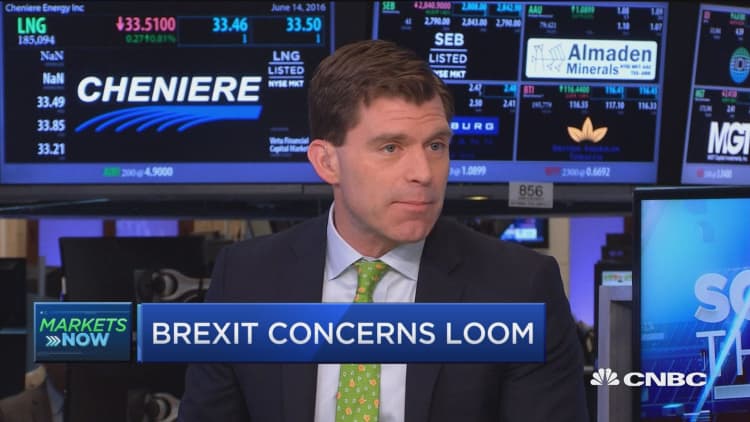
With a Federal Reserve meeting and vote on whether the U.K. will leave the European Union approaching, markets are dealing with a big dose of uncertainty. Art Hogan, chief market strategist at Wunderlich Securities, says there's no point in gambling on a "seismic event" like a Brexit.
"Why would you make a big bet stepping in front of that?" Hogan told CNBC's "Squawk on the Street" on Tuesday. "I think there's very little that you need to do in front of that, so the market may be in stall-mode until then."
Polls that measure U.K. citizens' likelihood to vote for exiting the European Union, known as the Brexit, have shifted momentum this week. A YouGov survey this week showed 46 percent now support leaving the bloc, while 39 percent support staying. Newspaper The Sun meanwhile, in a recent editorial, urged British readers to leave the European Union.
Hogan and his team at Wunderlich believe the U.K. will remain a part of the European Union, although he said it's too close to call. The U.S. Federal Reserve feels the same way about the vote, he said.
"The Fed's not gonna make a move in a June meeting, notwithstanding a sloppy labor market, in front of a Brexit vote," Hogan said. "Nor should investors."
The Federal Reserve meets Wednesday for a policy meeting and will announce its decision on a June rate hike. Slow job creation in May, with just 38,000 new jobs added for the month versus economists' expected 162,000, according to Thomson Reuters, casts doubt on the chances of a rate hike.
"We need to get through at least this Fed meeting, which I think comes and goes and is a nonevent, and we need to get through the Brexit vote, which I also think will be a nonevent," Hogan said.
Global yields, however, are not dubbing it a nonevent. German bund yields went negative for the first time ever Tuesday. The 10-year benchmark German bund yield dipped as low as negative 0.03.
"It's manifesting itself much more in global yields than in currency markets and equity markets," Hogan said. "At the end of the day, we've got a stay vote and then we can move on and start looking more constructively about that market."

Rob Arnott, chairman and CEO of Research Affiliates, agreed that rising uncertainty is putting pressure on markets. Regardless of the outcome though, Arnott told CNBC a post-Brexit market is likely to do better.
"I think it's more likely than not we'll see a pop in the markets no matter which way this plays out," Arnott told CNBC's "Squawk Alley" on Tuesday. "Once the vote happens, a certain measure of uncertainty is gone."
A Brexit may be a nonissue long-term, he said.
"Roll the clock forward 10 years: Is Europe still going to be trading with the U.K.? Of course they will," Arnott said. "The only real issue is how nasty is that intervening two to three years while they sort out logistics and details."
The European Central Bank meanwhile is preparing to buy corporate bonds as a part of stimulus plans to lift low inflation. Arnott said the intervention is leading to a "major malinvestment" by intervening in the capital economy, and goes beyond the bank's role.
"The way the central banks are behaving is as if a handful of wisemen that can make decisions on prices more soundly than millions of consumers, millions of borrowers and lenders," he said. "Let's let the markets sort this out."
A healthy economy, Arnott said, is one that prices in its own decisions.
"The classic and visible hand of the marketplace that Adam Smith talks about is being tied behind our backs, and isn't allowed to function to allocate capital," Arnott said.
But with the market uncertainty comes opportunity, he said. Arnott pointed to emerging market stocks and bonds that come with risk but are priced at 11 times earnings. Hogan meanwhile suggested investors shy away from domestic "dividend darlings" or stocks with high-yielding dividends.
"They've gotten very expensive and they continue to do so," Hogan said. "If you look at the multiples on utilities or staples or telecoms, and the yields being at historic lows, you want to be careful there because it's a very crowded trade."
Hogan suggested rotating out of that space, and said technology and consumer discretionary stocks are "probably the right move."


